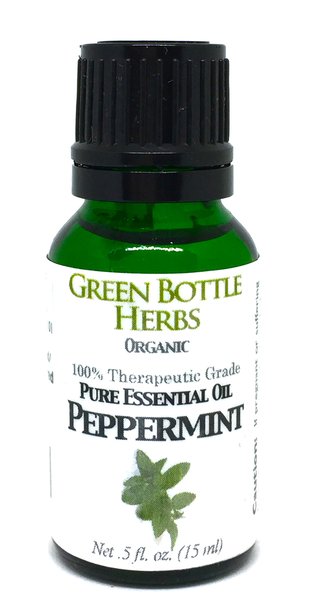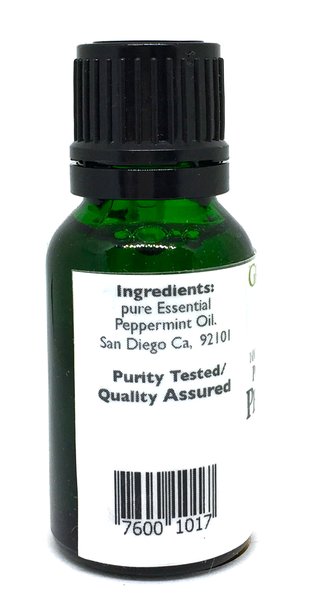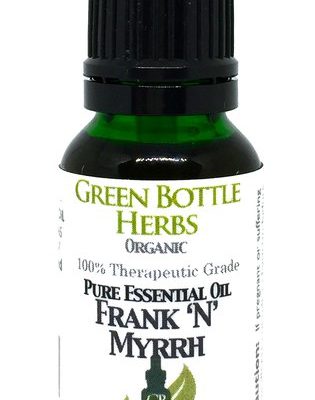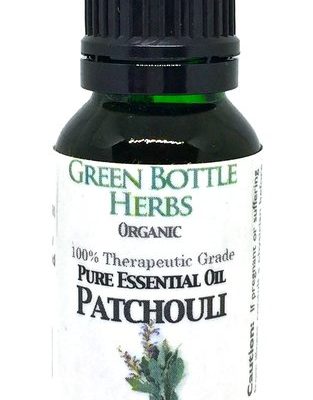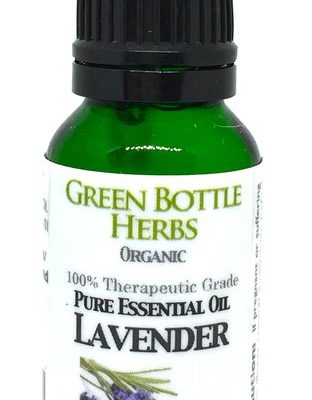Description
Botanical Name: Mentha piperita
Extraction: Steam distilled
Parts Used: Flowering plant
Aroma: Fresh, very minty, hot, herbaceous,
with a vegetative back note
Origin: Japan
Traditional Use: Has many culinary and pharmaceutical uses. It is also used for its soothing qualities on the digestive system.
Properties: Analgesic, antibacterial, anti-inflammatory, antifungal, antimicrobial, antiseptic, antispasmodic, astringent, carminative, cholagogue, cordial, digestive, emmenagogue, expectorant, febrifuge, insecticide, nervine, sedative, stimulant, stomachic, vasoconstrictor, vermifuge
Blends Well With: Basil, benzoin, black pepper, cypress, eucalyptus, geranium, grapefruit, juniper, lavender, lemon, marjoram, niaouli, pine, ravensara, rosemary, tea tree
Safety Data: Avoid in epilepsy and while pregnant. May cause skin irritation. Avoid with homeopathics.
General: As with all essential oils, never use them undiluted, in eyes or mucus membranes. Do not take internally unless working with a qualified and expert practitioner. Keep away from children. If applying an essential oil to your skin always perform a small patch test to an insensitive part of the body after you have properly diluted the oil in an appropriate carrier.
Ingredients: Organic Peppermint Essential Oil
The Essential: 6 Uses For Peppermint Essential Oil
Peppermint essential oil has so many uses, it’s no wonder this oil is a staple in many people’s medicine cabinets. And it certainly does much more than freshen your breath! It’s used to soothe nausea and other stomach issues, perk the senses up before a long meeting, and cool overworked muscles (thanks to the menthol). Luckily, peppermint also helps to clear congestion, quiet headaches and tackle symptoms from PMS.
It is important to note that peppermint essential oil is intense and far more concentrated than other essential oils. The topical application of peppermint oil is generally safe, although it is necessary to dilute with a carrier oil like almond or jojoba oil. It is advised that some people may experience a burning sensation or allergic rash, especially with sensitive skin. And more importantly, it is never advised to use on young children.
The entire plant contains menthol, an organic compound with local anesthetic properties which provides a wonderful cooling sensation while it naturally alleviates discomfort. It also has antibacterial, antiviral, anti-inflammatory, insecticidal, antispasmodic and carminative properties.
The health benefits of peppermint oil include its ability to treat:
Indigestion: One of the oldest and most highly regarded herbs for soothing digestion is peppermint. Peppermint oil is very helpful in digestion asithas a carminative property of expelling gas (from the stomach or intestines so as to relieve flatulence or abdominal pain or distension).
Massage several drops on your abdomen, place a drop on wrists, or inhale to soothe motion sickness or general nausea.
Drinking mint tea has long been the antidote to an upset stomach.
Inhaling peppermint oil is also said to help curb the appetite by triggering a sense of fullness.
Colds/Congestion: Menthol provides effective relief from many respiratory problems including nasal congestion, sinusitis, asthma, bronchitis and the common cold and cough. It is often included as an ingredient in natural chest rubs to help with congestion.
Massage 2-3 drops (along with a carrier oil) onto chest or drop into a humidifier to help clear sinus and lung congestion.
If you’re head is feeling stuffed or you can’t stop coughing, try a peppermint essential oil steam. Pour boiling water into a metal or glass bowl, and add a few drops of essential oil (eucalyptus and rosemary are good combinations with peppermint). Drape a towel over your head and position your face 10-12 inches above the bowl and breathe in the steam.
Headache: Peppermint oil is terrific to keep on hand at your desk or in your purse, especially if you are prone to headaches. The use of this oil has also been known to effectively lessen tandem symptoms such as nausea, vomiting, sensitivity to noise and sensitivity to light.
With a small amount of almond or other carrier oil and a drop of peppermint oil, rub on your temples, forehead, over the sinuses (avoid contact with eyes), and on the back of the neck to help soothe headache and pressure. When applied topically, peppermint oil leaves a soothing, cooling sensation that tends to work wonders.
Stress: Like many other essential oils, peppermint is able to provide relief from stress, depression and mental exhaustion due to its refreshing nature. It is also effective against feeling anxious and restless.
For stress relief, the combination of peppermint, lavender and geranium essential oils added to a warm bath help relieve stiffness while absorbed through the skin.
Try aromatherapy by using a candle lamp diffuser with essential oils.
Energy/Alertness: Peppermint oil powerfully affects and improves mental clarity and raises energy levels. If you’re trying to cut back on caffeine, this may be a blessing to your mid-afternoon lull.
Rub a drop of oil under the nose to help improve concentration and alertness.
Diffuse Peppermint oil in the room to improve concentration and accuracy.
Apply to the back of the neck and shoulders repeatedly to keep energy levels up during the day.
Inhale before and during a workout to help boost your mood and reduce fatigue.
Sore Muscles: Because peppermint oil has analgesic, anti-inflammatory and anti-spasmodic properties, it not only can relieve pain and inflammation but can also calm the spasms that cause muscle cramps.
When using Olba’s oil as massage oil (a combination of essential oils including peppermint), it has the remarkable ability to stimulate circulation at the surface of the skin by opening up the skin pores and bringing a soothing warm feeling to tired muscles and joints. This oil can also be used as a spot treatment for a quick effect.
And the list of uses goes on….
UPDATE: here’s another use! For bug bites, use a combination of peppermint essential oil and lavender essential oil to quickly dismiss the itch! It’s really similar to the logic of using toothpaste or menthol cream, but without the messy paste. Remember to dilute with a carrier oil if you are sensitive to straight essential oil on your skin.
Add some peppermint oil to shampoo to treat dandruff.
If you have a problem with ants in your house, leave a peppermint soaked cotton ball in their pathway. They’re not big fans of mint and you’ll have the nice aroma lingering in your home!
For tired aching feet, add a few drops to a foot bath for some relief of sore, swollen and overworked feet!
Give your trash can area a break and add a few drops to the bottom for a pleasant minty aroma.
Green Bottle Herbs does not claim that its products will cure any diseases. Information on this web site is for educational purposes only. Always consult with a qualified health practitioner before deciding on any course of treatment, especially for serious or life-threatening illnesses. This information is not intended to diagnose, treat, cure, or prevent any disease.

